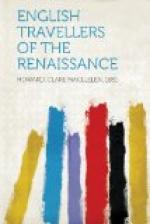vehicle of such poets as Politian and Bembo, Ronsard
and Du Bellay. A vernacular literature of great
beauty, too important to be overlooked, began to spring
up on all sides. One could no longer keep abreast
of the best thought without a knowledge of modern
languages. More powerful than any academic leanings
was the Renaissance curiosity about man, which could
not be satisfied through the knowledge of Latin only.
Hardly anyone but churchmen talked Latin in familiar
conversation with one. When a man visited foreign
courts and wished to enter into social intercourse
with ladies and fashionables, or move freely among
soldiers, or settle a bill with an innkeeper, he found
that he sorely needed the language of the country.
So by the time we reach the reign of Edward
vi.,
we find Thomas Hoby, a typical young gentleman of
the period, making in his diary entries such as these:
“Removed to the middes of Italy, to have a better
knowledge of ye tongue and to see Tuscany.”
“Went to Sicily both to have a sight of the
country and also to absent myself for a while out of
Englishmenne’s companie for the tung’s
sake."[33] Roger Ascham a year or two later writes
from Germany that one of the chief advantages of being
at a foreign court was the ease with which one learned
German, French, and Italian, whether he would or not.
“I am almost an Italian myself and never looks
on it.” He went so far as to say that such
advantages were worth ten fellowships at St John’s.[34]
We have noted how Italy came to be the lode-stone
of scholars, and how courtiers sought the grace which
France bestowed, but we have not yet accounted for
the attraction of Germany. Germany, as a centre
of travel, was especially popular in the reign of
Edward the Sixth. France went temporarily out
of fashion with those men of whom we have most record.
For in Edward’s reign the temper of the leading
spirits in England was notably at variance with the
court of France. It was to Germany that Edward’s
circle of Protestant politicians, schoolmasters, and
chaplains felt most drawn—to the country
where the tides of the Reformation were running high,
and men were in a ferment over things of the spirit;
to the country of Sturm and Bucer, and Fagius and
Ursinus—the doctrinalists and educators
so revered by Cambridge. Cranmer, who gathered
under his roof as many German savants as could survive
in the climate of England,[35] kept the current of
understanding and sympathy flowing between Cambridge
and Germany, and since Cambridge, not Oxford, dominated
the scholarly and political world of Edward the Sixth,
from that time on Germany, in the minds of the St
John’s men, such as Burleigh, Ascham and Hoby,
was the place where one might meet the best learned
of the day.




